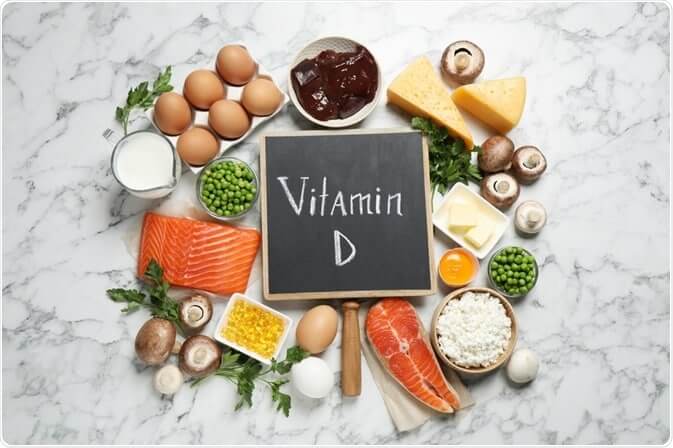Vitamin D and Athletic Performance in Athletes
Vitamin D has always been recommended as part of a healthy diet for many reasons. Having the properties of both a vitamin and hormone, vitamin D is necessary for the proper formation of bones, mineral homeostasis and several other essential functions in the body.
This is why vitamin D is now added to foods or nutritional supplements to help enhance human performance, especially for athletes who have been reported to be among the most vulnerable for vitamin D deficiency.
Vitamin D: An overview
Also called calciferol, vitamin D is a fat-soluble vitamin that can be obtained from foods, dietary supplements and from the ultraviolet (UV) rays of the sun, which triggers vitamin D synthesis. Vitamin D comes in 2 forms (D2 and D3). The main storage of Vitamin D is in the liver, with a half-life of around 15 days.
Vitamin D from these sources is metabolized through two hydroxylations before it can be activated. The first step occurs in the liver where inert vitamin D is converted to 25-hydroxyvitamin D [25(OH)D] called calcidiol. The second hydroxylation occurs in the kidney where 1,25-dihydroxyvitamin D [1,25 (OH)2D] or calcitriol is formed.
Without vitamin D only 10-15% of calcium would be absorbed AND only 60% of phosphorus would be absorbed. Vitamin D receptors are present in almost all cells of the body.
Over the years, several structural vitamin D analogs have been synthesized and produced for the treatment of different medical conditions. Some of its most popular forms include:
- This pre-hormone is produced in the liver and measured in blood tests to determine vitamin D levels in the body.
- This active form of vitamin D is made in the kidney and primarily used for treating low blood calcium and hyperparathyroidism in kidney disease.
- This synthetic vitamin D2 analog is used for treating primary or secondary hyperparathyroidism in patients with chronic kidney disease.
- This analog is used to prevent and treat secondary hyperparathyroidism due to chronic kidney failure.
Vitamin D and its functions
Vitamin D is essential to the body, as it has several important functions that help promote complete wellbeing and prevent or treat different medical conditions.
- Vitamin D and skeletal muscle function
Vitamin D and muscle growth have always been correlated. In fact, this vitamin is best known for strengthening the bones and regulating calcium homeostasis.
Vitamin D performs its mechanism of action on target tissues like the bones, kidney and intestines, and more evidence indicate that it is also essential in the function of other tissues including the skeletal muscle.
- Vitamin D and athletic performance
According to a study, athletes are predisposed to low vitamin D levels (below 20ng/ml) for a wide variety of sports. Data suggest that 47% of basketball professionals have vitamin D deficiency.
With its significant role in skeletal muscle function, bone health and inflammatory modulation, it is very important for athletes to maintain adequate levels of vitamin D in the body to enhance their athletic performance and prevent the occurrence of injuries while competing.
Vitamin D sources
As discussed, vitamin D can come from foods, dietary supplements and through the ultraviolet (UV) rays of the sun.
Food
Most foods contain no vitamin D (Liver has the highest amount). Food is still one of the most scarce sources of vitamin D.
In meat and fish, for instance, the animal’s diet usually affects the amount of vitamin D it has in its tissues. Wild caught salmon is a great example of a food source that is rich in Vitamin D. Some products are also treated with UV light to increase their vitamin D levels:
- Salmon. According to the USDA Food Composition Database, one 100-gram serving of farmed Atlantic salmon contains 526 IU of vitamin D. Other studies also suggest that wild salmon can contain up to 1,300 IU of vitamin D per serving
- Sardines contain about 200-500 IU in 3 oz
- Canned tuna. A 100-gram serving of canned light tuna contains up to 268 IU of vitamin D.
- Egg yolks. One egg yolk contains 37 IU of vitamin D.
- A 100-gram serving of wild mushrooms contain 2,300 IU of vitamin D.
Sunlight
- Exposure to sunlight can contain between 20,000 – 30,000 IU in 30 minutes of Vitamin D3.
- African Americans may need up to 10 X sun exposure to produce similar amounts of vitamin D.
- You can’t overdose from vitamin D with sunshine.
- Need longer exposure time in the winter (May be difficult to obtain sufficient amounts in northern latitudes).
Supplements
Cod liver oil is still one of the best sources of vitamin D, as it contains about 448 IU per teaspoon, which meets 56% of the daily required vitamin D intake.
Vitamin D2 vs. Vitamin D3 supplementation
Vitamin D comes in two primary forms: ergocalciferol (vitamin D2) and cholecalciferol (vitamin D3). Here are some of their most obvious differences:
- Vitamin D2 comes from fortified foods and plants such as mushrooms and dietary supplements while vitamin D3 can only be found in animal-sourced foods such as fish and fish oil, egg yolk, liver and butter.
- Vitamin D2 is cheaper to produce, which is why it’s more prevalent in dietary supplements and fortified food sources.
- Although both forms of vitamin D are absorbed well in the bloodstream, vitamin D3 is more effective in increasing vitamin D levels in the body. Studies have shown that Vitamin D3 is 9x more potent than Vitamin D2.
Vitamin D dosage for improved human performance
Several studies have already been conducted to determine how vitamin D supplementation can help improve human performance.
Although these evidences are still conclusive, some results have suggested that regular vitamin D supplementation can help improve performance, especially in athletes. Some of these include:
- Professional rugby, football and horse racing players who took 5,000 IU/day for 8 weeks exhibited an increase in vertical jump height
- Professional rowers who took 6,000 IU/day for 8 weeks had increased VO2 max levels
- Professional ballet dancers who took 2,000 IU/day for 4 months showed increased isometric force
- Judo athletes who took a one-time dose of 150,000 IU showed significant increase in muscle strength
Summary
Even before the pandemic, the Department of Health and Social Care already recommends regular intake of vitamin D as part of a healthy diet. Aside from food and sunlight, you can also buy vitamin D supplements for both children and adults in pharmacies and supermarkets.
Vitamin D has been proven to be beneficial in fighting different medical conditions like reducing the risk for multiple sclerosis, flu and even heart disease.
Recent studies also revealed that vitamin D could play an important role in regulating mood and reducing the occurrence of anxiety and depression.
For those who want to lose weight, a study suggested that people who took daily vitamin D and calcium supplementations were able to lose weight faster than those who didn’t take them. This is mainly because the combination of both vitamin D and calcium helps suppress the appetite.
References:
https://www.ncbi.nlm.nih.gov/pmc/articles/PMC3968073/
https://www.dairynutrition.ca/nutrients-in-milk-products/vitamin-d/functions-of-vitamin-d
https://www.nhs.uk/conditions/vitamins-and-minerals/vitamin-d/
https://ods.od.nih.gov/factsheets/VitaminD-HealthProfessional/
https://www.ncbi.nlm.nih.gov/pmc/articles/PMC7071499/
https://www.healthline.com/nutrition/9-foods-high-in-vitamin-d
https://www.healthline.com/nutrition/vitamin-d2-vs-d3
https://www.healthline.com/health/food-nutrition/benefits-vitamin-d


